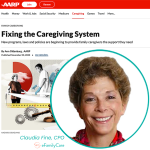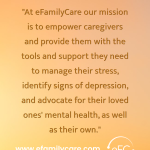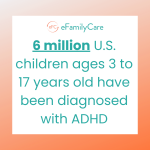The Long-Awaited Convergence of CMS, Clinical Care, Social Care, and Family Care is Here
Right in time for National Family Caregivers Month, which this year has the theme #BeCareCurious, the Centers for Medicare & Medicaid Services has come out and validated the importance of family caregivers and their critical role in providing care for those who aren’t able to care for themselves.
Caregivers are everywhere
When you walk down the corridor at work or the aisles in your neighborhood grocery it’s likely that you’ll walk by someone who is concerned about or provides care for a spouse, parent or grandparent, or someone who has a family member in that role. Like you, they probably feel isolated and alone with their caregiving challenges.
Now, eFamilyCare is here to help. The company recognizes that while your problems are similar to other caregivers’ problems, what you’re dealing with is still unique to you. eFamilyCare offers expert personal advisers who can partner with you so that you don’t have to face these challenges alone.
We are millions strong
According to the Family Caregiver Alliance and AARP, approximately 43.5 million caregivers provided unpaid care to an adult or child in 2015. Considering how quickly the over-65 demographic of our population is growing, it’s thought that by 2040, one in five people in the US will be over 65. This means, of course, that the number of families providing care will grow accordingly.
Haven’t people always cared for their aging relatives?
Well, yes, they have. However, many things have changed. Life expectancy has increased over the years due to advances in medical care and other factors such as nutrition. What this means is that now we frequently have older adults in their 70s caring for their parents who are in their 90s. Additionally, in the past, most households had someone at home all day, in most cases the mother. She was there not only to take care of the children but to take care of the older adults in the family as their needs increased. Now, it’s more common for the wife/mother to work outside of the home, whether by choice or necessity. Yet, these same women are expected to take care of their aging parents and in-laws. How are they supposed to handle this? The founders of eFamilyCare saw this need and intend to be your go-to resource that will make your caregiving experience easier.
How eFamilyCare works
There’s a void in our healthcare system that eFamilyCare is here to fill. That void is blatantly apparent when we accompany a parent or spouse to a medical appointment, and are confronted with complicated medical information, complicated logistical issues and unclear care plans to follow. We’ve just gained what feels like another full-time job for which we are often completely unprepared.
Because the people behind eFamilyCare have decades of experience in the fields of healthcare, homecare, and aging, they can help you sort through this often overwhelming information and assist in determining your next steps. They’ll provide expert professional advice, resources, and real-time support that enables you to manage your aging loved ones’ care without compromising your own wellbeing.
The fact that your personal advisor is available to you at all hours is an enormous benefit, because every family caregiver knows that caregiving problems are not an eight-to-five issue, they occur around the clock.
How important is this? Think about it.
- Though your mom is 87, her memory has been excellent, yet during your last visit, she seems somewhat disoriented. Is this just normal aging or is should you be lining up a medical intervention? If a medical intervention is needed, what kind of doctor do you see? Your care adviser will provide you with professional, peer reviewed tools so that you can objectively assess what you are “sensing”. Based on these findings, you and your care adviser will determine the best approach to obtain a clinical diagnosis and formulate a subsequent plan of care to improve your mother’s wellbeing and safety.
- Your dad’s taken several tumbles lately, but he’s brushing off the issue. You’re worried. How should you handle this? Your care adviser will coach you on how to overcome your father’s resistance to discussing the circumstances surrounding his falls with the goal of engaging him in a plan to improve his strength, stability and safety.
- Your spouse has cancer. How do you support her? A cancer diagnosis is frightening for both patients and their loved ones. The most effective way for you to provide support for your wife is to make certain that you have the support you need. Your care adviser will research information to help you build an understanding of your wife’s condition and the best way to navigate the complex health care system during the course of her illness. Together, you will identify ways to advocate for the best care for her. You will feel empowered and she will feel supported.
#Becarecurious
The previously mentioned recognition by CMS should be helpful as caregiving comes out of the shadows. Additionally, most states have passed what is known as CARE (Caregiver Advise, Record, Enable) Act. While this legislation won’t solve all of your caregiving problems, it’s another step forward in recognizing family caregivers as part of their loved one’s healthcare team.
Your Area Agency on Aging, which has been in place for many years, is an exceptional resource that you shouldn’t miss. You can find your local chapter by visiting N4A.org.
The National Alliance for Caregiving is packed with resources for caregivers, even offering online support groups.
It may not be enough, however, to locate resources. Caregivers often need help determining whether a resource is actually suited to the caregivers’ unique challenges. This is why eFamilyCare’s approach is unique.
At eFamilyCare you can have an around-the-clock personal advisor available to you by tapping your phone app. What an incredible way to help break through the confusion and overcome those overwhelming feelings of stress and isolation.
#BeCareCurious and see what they can do for you.
Written by: Carol Bradley Bursack







